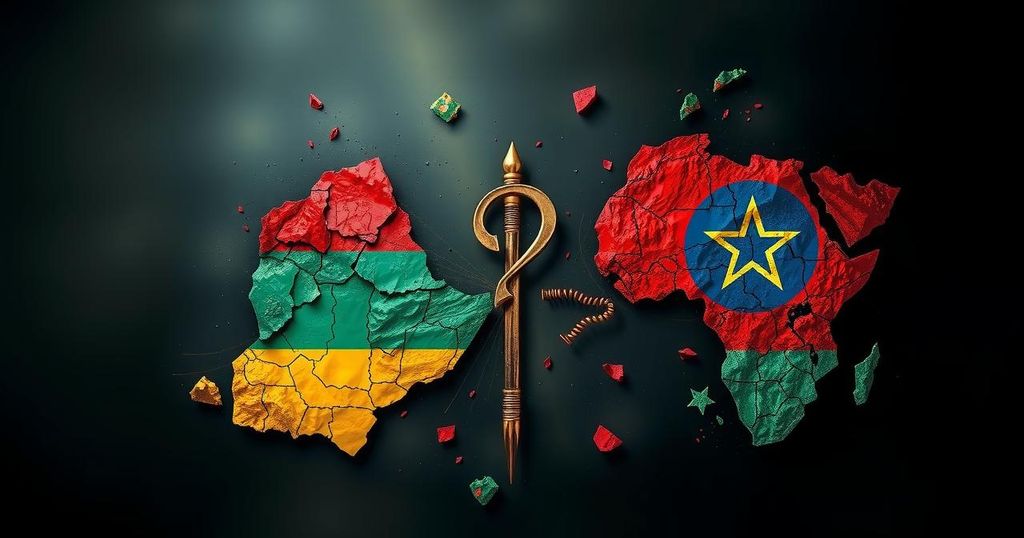Somalia-Ethiopia Escalation: An Examination of Diplomatic Strain and Regional Alliances
The diplomatic rift between Somalia and Ethiopia has intensified, leading to the expulsion of Ethiopian diplomat Ali Mohamed Adan over allegations of interference in Somalia’s internal affairs. This follows previous tensions involving diplomatic expulsion and controversial agreements between Ethiopia and Somalia’s breakaway regions. Somalia is strengthening alliances with neighboring countries and global powers like Egypt and Turkey amidst fears of Ethiopia’s expanding influence.
Recent tensions between Somalia and Ethiopia have significantly escalated, with Somalia’s Foreign Ministry ordering the expulsion of Ethiopian diplomat, Ali Mohamed Adan. The Ministry accused Mr. Adan, a counselor at Ethiopia’s embassy in Mogadishu, of engaging in activities deemed incompatible with his diplomatic position, asserting that he violated the Vienna Convention on Diplomatic Relations by interfering in Somalia’s internal matters. This incident follows a series of diplomatic disputes, including the expulsion of Ethiopia’s ambassador in April, which Somalia justified by citing Ethiopia’s infringement of its sovereignty. The backdrop to these recent expulsions is Ethiopia’s increasing engagement with Somalia’s breakaway regions, particularly Puntland and Somaliland. Ethiopia’s dealings with Puntland, which recently declared non-recognition of Somalia’s federal authority, have sparked allegations of unauthorized arms shipments. Furthermore, Ethiopia had previously entered into a deal with Somaliland to enhance military and commercial ties, a region that has sought independence since 1991 but remains unrecognized internationally. Somalia’s response has involved strengthening its security collaborations with neighboring countries and additional support from nations such as Egypt and Turkey. Egypt, embroiled in its own disputes with Ethiopia regarding the Grand Ethiopian Renaissance Dam, has actively engaged in defense agreements with Somalia. Correspondingly, Uganda recently noted that military assistance from Egypt had been provided. Meanwhile, Turkey has bolstered its military presence in Somalia, backing the government amid these rising tensions with Ethiopia. Turkey has also facilitated reconciliation efforts, although discussions so far have not yielded substantial results.
The political landscape between Somalia and Ethiopia is intricately tied to regional sovereignty, with both nations historically engaging in confrontational diplomacy. Ethiopia’s involvement in Somalia’s internal affairs is part of a broader strategy to influence various regions within Somalia. The diplomatic rift is marked by Somalia’s perception of external interference, notably illustrated by its expulsion of Ethiopian diplomats amid allegations of breach of diplomatic conduct. Concurrently, Ethiopia’s agreements with local authorities in Somalia’s regions raise alarms in Mogadishu regarding territorial integrity and governance. The international context includes active participation from Egypt and Turkey, as both nations perceive their interests in the Horn of Africa region amidst tensions involving water rights and military positioning.
The recent diplomatic crises between Somalia and Ethiopia underscore ongoing territorial and political frictions exacerbated by external influences. Somalia’s decisive actions against Ethiopian diplomats signal a recognition of perceived sovereignty violations, while Ethiopia’s maneuvers in breakaway regions complicate the stability of the Somali federal government. Additionally, the involvement of Egypt and Turkey highlights a complex geopolitical struggle in the Horn of Africa, with regional security implications. As negotiations remain stalled, the potential for escalating tensions may influence future diplomatic and military dynamics.
Original Source: www.al-monitor.com




Post Comment